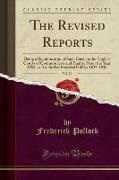Read more
Excerpt from The Revised Reports, Vol. 29: Being a Republication of Such Cases in the English Courts of Common Law and Equity, From the Year 1785, as Are Still of Practical Utility; 1825-1830
Estoppel being at the bottom of our rule, the other party cannot accordingly be prejudiced. The grantee may dis claim, though the grantor may not revoke. Estoppel, though founded on considerations of mutual justice, is essentially one-sided in its Operation. If promises, then, are made by deed, they must be made according to the nature of a deed. If you want to have your deed condi tional or revocable, you must express it so to be. Modern law may one day, perhaps, see its way to dispensing with deeds altogether. The American method of whittling away the characteristic qualities of the deed till there is nothing left but a paper writing signed with a ¿ourish, or other wise slightly emphasized, seems rather half-hearted, and likely to confuse the ideas of beginners.
About the Publisher
Forgotten Books publishes hundreds of thousands of rare and classic books. Find more at www.forgottenbooks.com
This book is a reproduction of an important historical work. Forgotten Books uses state-of-the-art technology to digitally reconstruct the work, preserving the original format whilst repairing imperfections present in the aged copy. In rare cases, an imperfection in the original, such as a blemish or missing page, may be replicated in our edition. We do, however, repair the vast majority of imperfections successfully; any imperfections that remain are intentionally left to preserve the state of such historical works.

